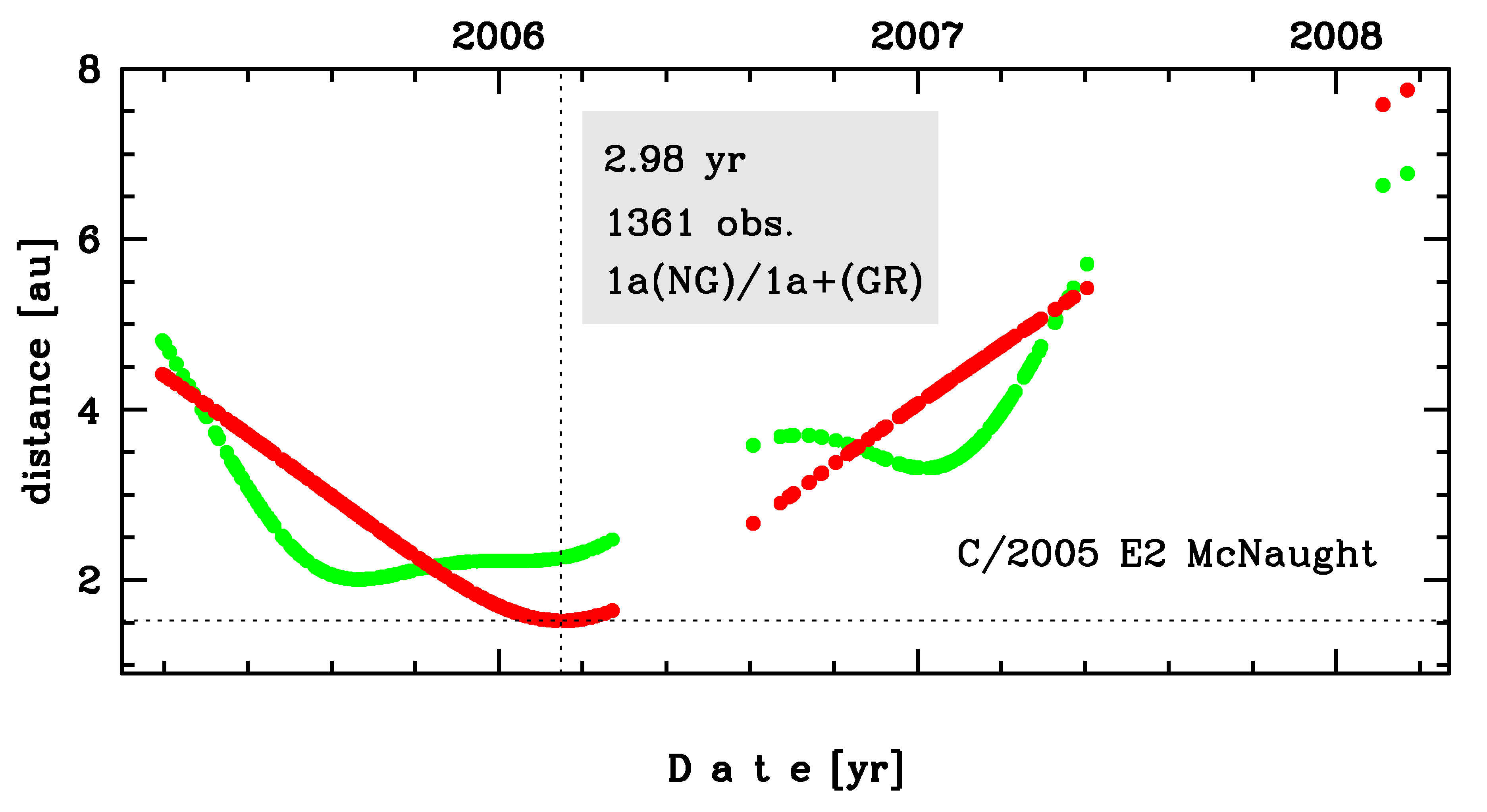C/2005 E2 McNaught
more info
Comet C/2005 E2 was discovered on 12 March 2005 by Robert H. McNaught (Siding Spring); that is about 11 months before its perihelion passage. It was observed until 3 March 2008 (see picture).
Comet had its closest approach to the Earth on 30 August 2005 (2.006 au), about 5.5 months after its discovery.
Solutions given here are based on data spanning over 2.98 yr in a range of heliocentric distances: 4.42 au – 1.582 au (perihelion) – 7.76 au.
This Oort spike comet suffers notable planetary perturbations during its passage through the planetary system; these perturbations lead to escape the comet from the planetary zone on a hyperbolic orbit with future eccentricity of 1.0040 (see future barycentric orbits).
See also Królikowska 2020
Comet had its closest approach to the Earth on 30 August 2005 (2.006 au), about 5.5 months after its discovery.
Solutions given here are based on data spanning over 2.98 yr in a range of heliocentric distances: 4.42 au – 1.582 au (perihelion) – 7.76 au.
This Oort spike comet suffers notable planetary perturbations during its passage through the planetary system; these perturbations lead to escape the comet from the planetary zone on a hyperbolic orbit with future eccentricity of 1.0040 (see future barycentric orbits).
See also Królikowska 2020
| solution description | ||
|---|---|---|
| number of observations | 1361 | |
| data interval | 2005 03 12 – 2008 03 03 | |
| data type | perihelion within the observation arc (FULL) | |
| data arc selection | entire data set (STD) | |
| range of heliocentric distances | 4.42 au – 1.52 au (perihelion) – 7.76 au | |
| type of model of motion | NS - non-gravitational orbits for standard g(r) | |
| data weighting | YES | |
| number of residuals | 2677 | |
| RMS [arcseconds] | 0.44 | |
| orbit quality class | 1a | |
| previous orbit statistics, both Galactic and stellar perturbations were taken into account | ||
|---|---|---|
| no. of returning VCs in the swarm | 0 | |
| no. of escaping VCs in the swarm | 5001 | * |
| no. of hyperbolas among escaping VCs in the swarm | 40 | |
| previous reciprocal semi-major axis [10-6 au-1] | 1.63 – 3.60 – 5.49 | |
| previous perihelion distance [au] | 1240 – 1280 – 1330 | |
| previous aphelion distance [103 au] | 360 – 550 – 1200 | |
| time interval to previous perihelion [Myr] | 3.21 ± 0.71 | |
| percentage of VCs with qprev > 20 | 100 | |
| previous_g orbit statistics, here only the Galactic tide has been included | ||
|---|---|---|
| no. of returning VCs in the swarm | 0 | |
| no. of escaping VCs in the swarm | 5001 | * |
| no. of hyperbolas among escaping VCs in the swarm | 0 | |
| previous reciprocal semi-major axis [10-6 au-1] | 6.38 – 8.15 – 9.83 | |
| previous perihelion distance [au] | 28.4 – 31.3 – 34.4 | |
| previous aphelion distance [103 au] | 200 – 250 – 310 | |
| time interval to previous perihelion [Myr] | 3.43 ± 0.71 | |
| percentage of VCs with qprev > 20 | 100 | |
